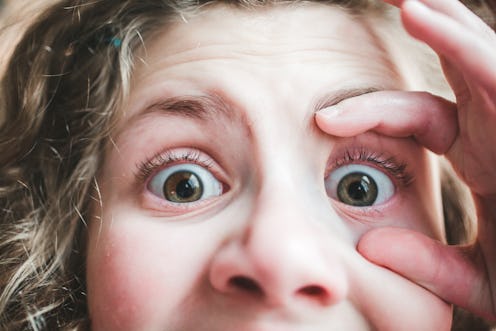
We've all been there: No matter what you do, your eye literally will not stop twitching. Sometimes it can get so bad that it seems like exactly how to make your eye stop twitching is a secret few of us are privy to. Whether your eye starts twitching while you're at work, in class, or driving your car, it's a major distraction; besides the fact that we're not always able to squeeze our eyes shut for minutes on end in the hope that it'll make the irritation go away (especially if you're in the aforementioned car situation!), eye twitches can also make us self-conscious. Is the person you're conversing with wondering what the heck is up with your face? So awkward.
So, why do our eyes twitch to begin with? And what can we do to make eye twitching stop? Luckily for us, there are some common explanations for why our eyes are prone to twitching, and what we can do to lower the likelihood of our peepers bugging out seemingly at random. As Kimberly Holland and Kristeen Cherney point out at Healthline, generally speaking, your eyelid twitching is totally normal and not cause for alarm. It is worth knowing that eyelid twitching can be a sign of rare neurological or nerve disorders — but again, this is incredibly rare, so whatever you're experience likely isn't cause for panic. (And, hey, if you're really worried about it, you can always get yourself to a doctor and let them have a look. Leave it to the pros, right?)
So, how do you cause your standard eye twitching to cease and desist? It's all about figuring out what's making it do that in the first place. Here are five common causes of twitching eyelids — and what you can do about them to stop your twitchy lid in its tracks:
Lower Your Caffeine Intake
According to Pia Grant at Livestrong, if you have too much caffeine at once, your eyes might begin twitching. Moderate caffeine intake — about two to four cups per day — is usually OK on your eyes, but beyond that, and twitches can occur from over-stimulation. It's also good to be aware of places caffeine can sneak into your diet, such as in tea or chocolate.
Get More Sleep
As explained at The Mayo Clinic, if you go without sleep, your eyes might react negatively. Getting enough sleep is integral to so many aspects of your sleep, including your ocular health. If you find yourself facing eye twitches a lot, take a look at how much sleep you get per night. How fatigued you are could certainly be the culprit.
Ease Your Stress Level
According to Burt Dubow, O.D. at All About Vision, stress is a very common reason people experience eye twitching. While it might seem easier said than done, Dubow recommends practicing self-care and stepping back from stress when you can. He suggests yoga, spending time with friends, and practicing deep breathing as ways to reduce stress on a regular basis.
Step Away From The Screens
According to Robert Joyce, O.D. at the Huffington Post, staring too long at a screen can definitely cause your eyes to twitch. While many of us need to look at screens for work, it's a good idea to assess how much you're straining your eyes when you're looking at screens. And remember: Watching TV, texting on your phone, and playing video games all count as screen time, and can all tire out your eyes.
Moisturize Your Eyes
As explained at WebMD, sometimes when your eyes are simply too darn dry, twitches can start. If you wear contact lenses, it's always a good idea to be careful to keep your lenses clean and moisturized. Even if you don't wear contacts, your eyes can dry out for a number of reasons, so it's good to have drops handy.
Images: Annie Otzen/DigitalVision/Getty Images; Giphy (5)